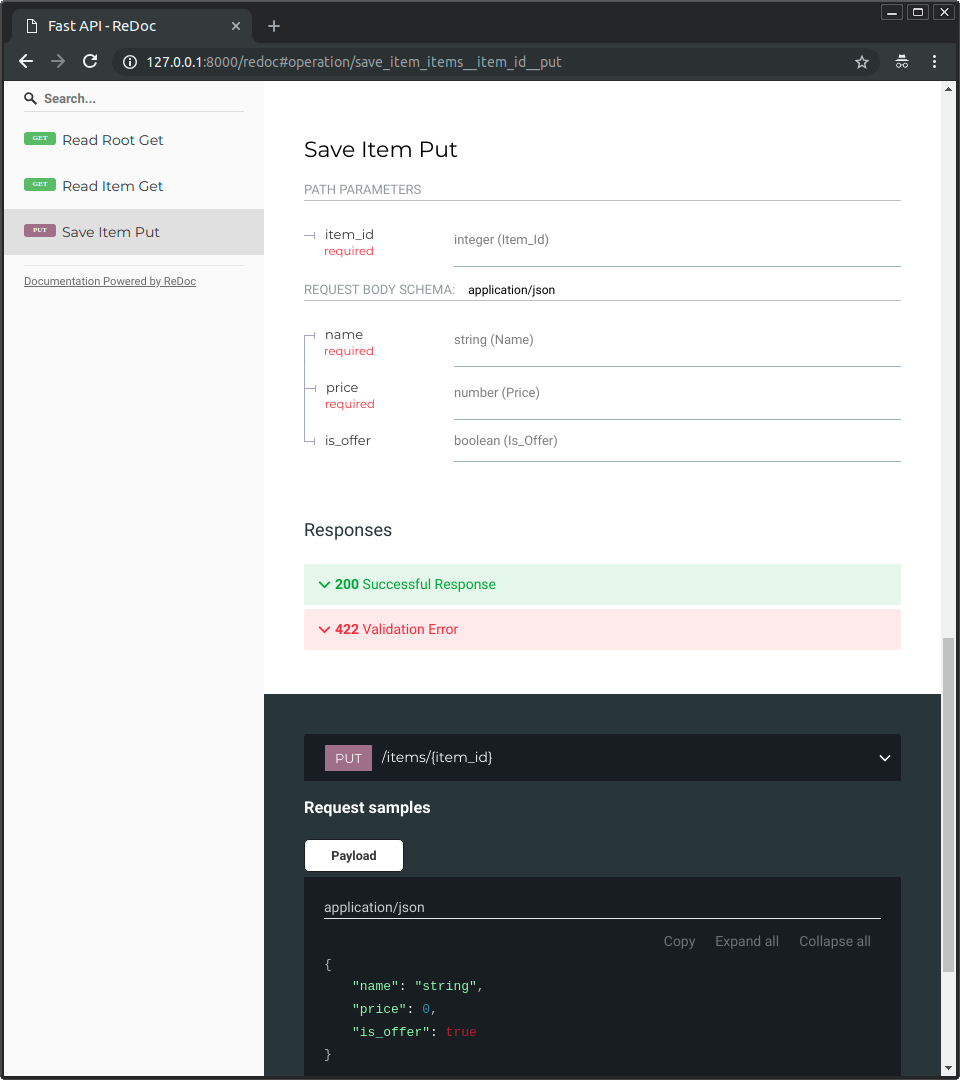- Sort Score
- Result 10 results
- Languages All
Results 1 - 10 of 21 for sintaxis (0.04 sec)
-
docs/es/docs/how-to/configure-swagger-ui.md
## Desactivar el resaltado de sintaxis { #disable-syntax-highlighting } Por ejemplo, podrías desactivar el resaltado de sintaxis en Swagger UI. Sin cambiar la configuración, el resaltado de sintaxis está activado por defecto: <img src="/img/tutorial/extending-openapi/image02.png">Registered: Sun Dec 28 07:19:09 UTC 2025 - Last Modified: Wed Dec 17 20:41:43 UTC 2025 - 3.2K bytes - Viewed (0) -
docs/es/docs/python-types.md
Si puedes usar las **últimas versiones de Python**, utiliza los ejemplos para la última versión, esos tendrán la **mejor y más simple sintaxis**, por ejemplo, "**Python 3.10+**". #### Lista { #list } Por ejemplo, vamos a definir una variable para ser una `list` de `str`. Declara la variable, con la misma sintaxis de dos puntos (`:`). Como tipo, pon `list`.Registered: Sun Dec 28 07:19:09 UTC 2025 - Last Modified: Wed Dec 17 20:41:43 UTC 2025 - 16.4K bytes - Viewed (1) -
docs/es/docs/tutorial/body-nested-models.md
pasa el/los tipo(s) interno(s) como "parámetros de tipo" usando corchetes: `[` y `]` ```Python my_list: list[str] ``` Eso es toda la sintaxis estándar de Python para declaraciones de tipo. Usa esa misma sintaxis estándar para atributos de modelos con tipos internos. Así, en nuestro ejemplo, podemos hacer que `tags` sea específicamente una "lista de strings":
Registered: Sun Dec 28 07:19:09 UTC 2025 - Last Modified: Wed Dec 17 20:41:43 UTC 2025 - 7.2K bytes - Viewed (0) -
docs/es/docs/features.md
 ### Solo Python moderno { #just-modern-python } Todo está basado en declaraciones estándar de **tipos en Python** (gracias a Pydantic). Sin nueva sintaxis que aprender. Solo Python moderno estándar. Si necesitas un repaso de 2 minutos sobre cómo usar tipos en Python (aunque no uses FastAPI), revisa el tutorial corto: [Tipos en Python](python-types.md){.internal-link target=_blank}.Registered: Sun Dec 28 07:19:09 UTC 2025 - Last Modified: Wed Dec 17 10:15:01 UTC 2025 - 10.8K bytes - Viewed (0) -
docs/es/docs/tutorial/dependencies/classes-as-dependencies.md
something(some_argument, some_keyword_argument="foo") ``` entonces es un "callable". ## Clases como dependencias { #classes-as-dependencies_1 } Puedes notar que para crear una instance de una clase en Python, utilizas esa misma sintaxis. Por ejemplo: ```Python class Cat: def __init__(self, name: str): self.name = name fluffy = Cat(name="Mr Fluffy") ``` En este caso, `fluffy` es una instance de la clase `Cat`.
Registered: Sun Dec 28 07:19:09 UTC 2025 - Last Modified: Wed Dec 17 20:41:43 UTC 2025 - 7.1K bytes - Viewed (0) -
docs/es/docs/tutorial/path-params-numeric-validations.md
* declarar el parámetro de query `q` sin un `Query` ni ningún valor por defecto * declarar el parámetro de path `item_id` usando `Path` * tenerlos en un orden diferente * no usar `Annotated` ...Python tiene una sintaxis especial para eso. Pasa `*`, como el primer parámetro de la función.
Registered: Sun Dec 28 07:19:09 UTC 2025 - Last Modified: Wed Dec 17 20:41:43 UTC 2025 - 6.4K bytes - Viewed (0) -
docs/es/docs/async.md
# Concurrencia y async / await { #concurrency-and-async-await } Detalles sobre la sintaxis `async def` para *path operation functions* y algunos antecedentes sobre el código asíncrono, la concurrencia y el paralelismo. ## ¿Con prisa? { #in-a-hurry } <abbr title="too long; didn't read"><strong>TL;DR:</strong></abbr> Si estás usando paquetes de terceros que te dicen que los llames con `await`, como: ```Python results = await some_library() ```Registered: Sun Dec 28 07:19:09 UTC 2025 - Last Modified: Wed Dec 17 10:15:01 UTC 2025 - 25.4K bytes - Viewed (0) -
docs/es/docs/alternatives.md
Y genera esquemas OpenAPI. Así es como funciona en Flask, Starlette, Responder, etc. Pero luego, tenemos otra vez el problema de tener una micro-sintaxis, dentro de un string de Python (un gran YAML). El editor no puede ayudar mucho con eso. Y si modificamos parámetros o esquemas de Marshmallow y olvidamos también modificar ese docstring YAML, el esquema generado estaría obsoleto.
Registered: Sun Dec 28 07:19:09 UTC 2025 - Last Modified: Wed Dec 17 10:15:01 UTC 2025 - 25.9K bytes - Viewed (0) -
docs/es/docs/tutorial/path-params.md
# Parámetros de Path { #path-parameters } Puedes declarar "parámetros" o "variables" de path con la misma sintaxis que se usa en los format strings de Python: {* ../../docs_src/path_params/tutorial001_py39.py hl[6:7] *} El valor del parámetro de path `item_id` se pasará a tu función como el argumento `item_id`.Registered: Sun Dec 28 07:19:09 UTC 2025 - Last Modified: Wed Dec 17 20:41:43 UTC 2025 - 9.8K bytes - Viewed (0) -
docs/es/docs/tutorial/response-model.md
Esto también se aplica a `response_model_by_alias` que funciona de manera similar. /// {* ../../docs_src/response_model/tutorial005_py310.py hl[29,35] *} /// tip | Consejo La sintaxis `{"name", "description"}` crea un `set` con esos dos valores. Es equivalente a `set(["name", "description"])`. /// #### Usar `list`s en lugar de `set`s { #using-lists-instead-of-sets }Registered: Sun Dec 28 07:19:09 UTC 2025 - Last Modified: Wed Dec 17 20:41:43 UTC 2025 - 17.7K bytes - Viewed (0)